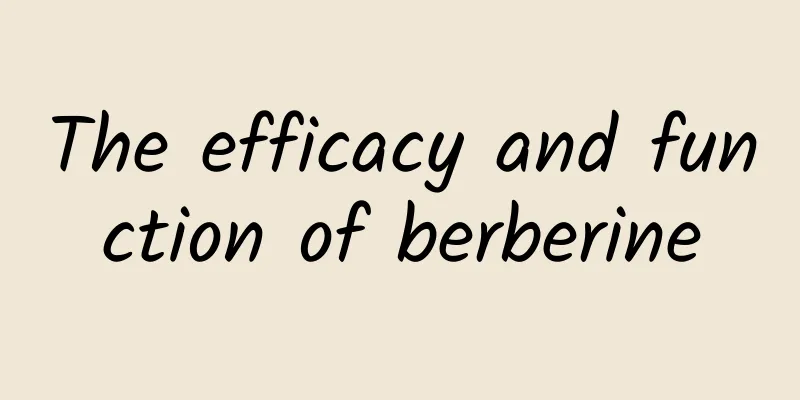The efficacy and function of berberine

|
Speaking of berberine, I believe many people are not unfamiliar with it. Because berberine is a drug that has a long history in my country. Berberine has very significant antibacterial and anti-inflammatory effects, and is very effective for gastrointestinal diseases and digestive system diseases caused by bacterial infections. In addition, berberine has other functions and effects. So what are the effects and functions of berberine? The medicinal value of berberine mainly comes from the fact that it is a medicine made up of the most essential parts extracted from precious plants such as Coptis chinensis, Coptis chinensis, Phellodendron chinense, and Tripterygium wilfordii. It is effective in controlling the increase in blood sugar levels and preventing the formation of blood clots due to hypertension. Below is a detailed introduction to the effects and functions of berberine. The efficacy and function of berberine Berberine is an important biological alkaloid and has been used in traditional Chinese medicine for a long time in my country. It can be extracted from plants such as Coptis chinensis, Phellodendron chinense, and Tripterygium wilfordii. It has significant antibacterial effect. The commonly used berberine hydrochloride is also called berberine hydrochloride, and its chemical structure is shown in the figure. Berberine can fight against pathogenic microorganisms and has inhibitory effects on many bacteria such as Shigella dysenteriae, Mycobacterium tuberculosis, Pneumococcus, Salmonella typhi and Corynebacterium diphtheriae. It has the strongest effect on Shigella dysenteriae and is often used to treat bacterial gastroenteritis, dysentery and other digestive tract diseases. It is mainly used clinically to treat bacterial dysentery and gastroenteritis, and it has fewer side effects. Effects and efficacy 1. Anti-pathogenic microbial effects: 1. Antibacterial effect; 2. Antiviral effect; 3. Antiprotozoal effect; 4. Antitoxic effect. 2. Effects on the cardiovascular system: 1. Anti-arrhythmia; 2. Lowering blood pressure; 3. Positive inotropic effect; 4. Clinical reports show that berberine has a protective effect on ischemic brain damage. 3. Hypoglycemic effect: A large number of pharmacological and clinical studies have confirmed that berberine not only has a significant hypoglycemic effect, but also has a good preventive and therapeutic effect on complications such as hypertension and thrombosis in diabetic patients. 4. Anti-inflammatory effect. 5. Inhibit platelet aggregation. 6. Enhance immune function. 7. Anti-cancer. 8. Other functions. 1. Anti-ulcer effect; 2. Antipyretic effect; 3. Coptis chinensis also has central nervous system inhibitory and choleretic effects. Note: 1. It is contraindicated for patients who are allergic to this product or have hemolytic anemia. Children with hereditary 6-phosphate glucose dehydrogenase deficiency should not use this product because it can cause hemolytic anemia and lead to jaundice. 2. Use with caution during the first three months of pregnancy. 3. If you experience serious adverse reactions after taking too much, please seek medical attention immediately. 4. It is prohibited to use the drug when its properties change. 5. Children must use it under adult supervision. 6. Please keep this medicine out of reach of children. 7. Do not take berberine and tea together. Drinking tea should be avoided within 2 hours before and after taking berberine. Tea contains about 10% tannin, which is a bioalkali precipitant. It can combine with the bioalkali in berberine to form insoluble tannate precipitate, reducing the efficacy of berberine. [Usage and Dosage] Oral, Adults: 1-3 tablets at a time, 3 times a day; For children, see the instructions for dosage. [Contraindications] It is contraindicated in patients with hemolytic anemia and glucose-6-phosphate dehydrogenase deficiency. Regarding the effects and functions of berberine, I believe that after reading the detailed introduction above, you have a general understanding of it. Berberine has many functions and effects, especially for middle-aged and elderly people. It has very good therapeutic effects in treating some cardiovascular diseases and enhancing the immunity of middle-aged and elderly people. However, there are many things to pay attention to when taking berberine. It is recommended that you consult a doctor before taking it. |
<<: Effects of Fuzi Lizhong Pills
>>: The efficacy and function of Tripterygium wilfordii
Recommend
Musk launches a rocket, and gives a seal headphones? Isn't this a joke?
Recently, a clip of Elon Musk's interview wit...
The efficacy and function of crape myrtle
Crape myrtle is a common medicinal ingredient in ...
What are the medicinal values of holly?
In life, many elderly people like to take Chinese...
Is phospholipid DHA better? Eat fish, fish oil or DHA eggs?
I've been getting a lot of questions lately a...
What are the ways to eat Polygonum multiflorum to treat gray hair?
Premature graying of hair is a relatively common ...
The effects and functions of saddle vine root
In fact, the occurrence of many human diseases is...
Why is the shrub-covered "Roof of the World" a "forbidden zone" for trees?
Friends who have traveled to the Qinghai-Tibet Pl...
What are the effects and side effects of pine pollen
In our daily life, pine pollen occupies an increa...
Sperm whales are quite smart, so why do they always get stranded?
Whale strandings are nothing new and occur almost...
Tiger grass has many functions and effects, including clearing away heat and detoxifying!
In nature, the family Polisiidae is a general ter...
The efficacy and function of Fengyan fruit shell
With the development of society and the close int...
The longest flight time is nearly 4 hours, and it can fly even at -40℃! The world's first hydrogen-powered ultra-long-range drone made its maiden flight successfully
Author Li Chuanfu August 26, 2024 is a memorable ...
The efficacy and function of cold fern
As for cold fern, I think some people may have he...
Taboos of using wormwood incense
The nature of mugwort is cold, and women's bo...
How long is the shelf life of Jiaogulan
Nowadays, people's living standards have grea...









